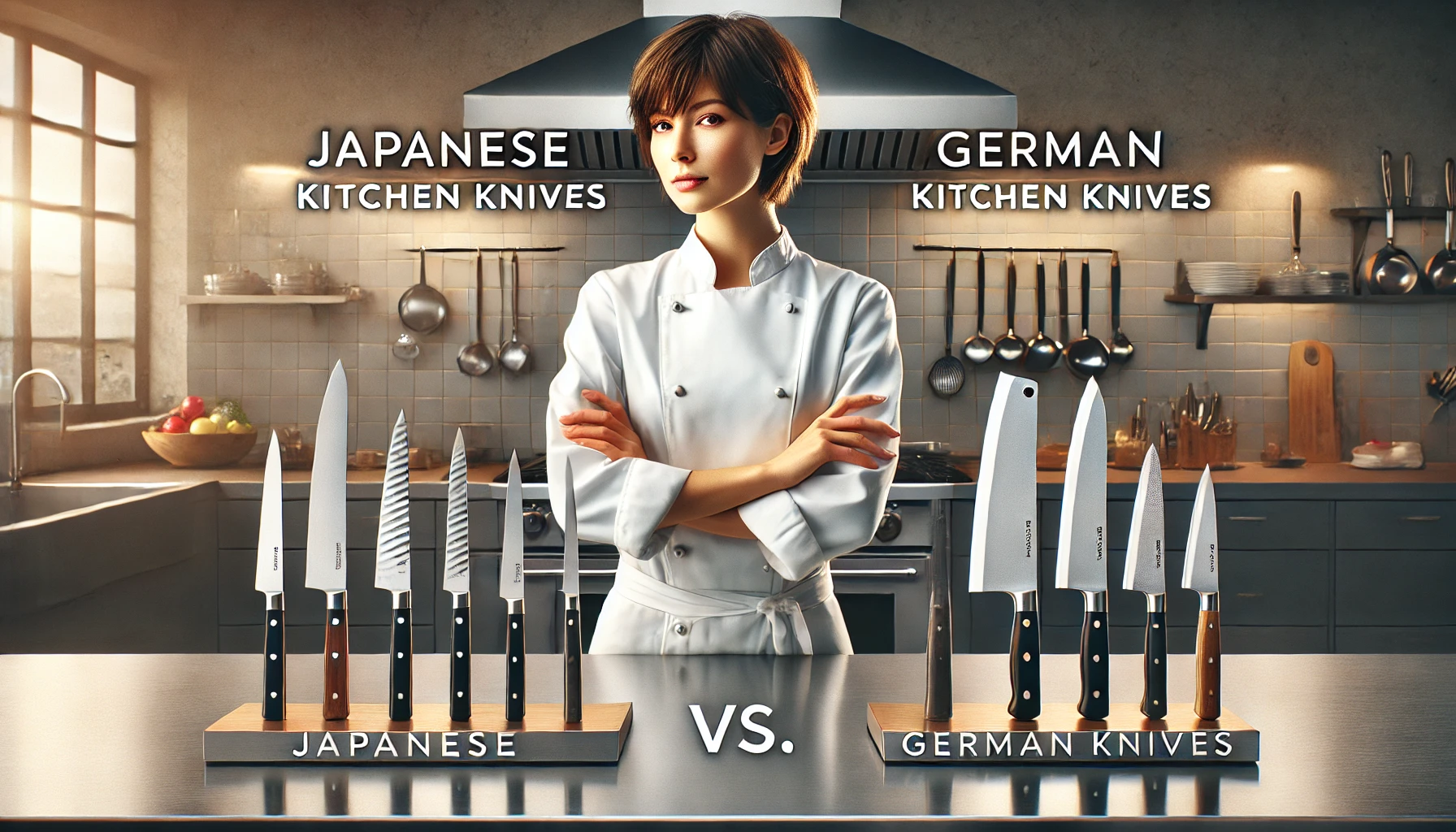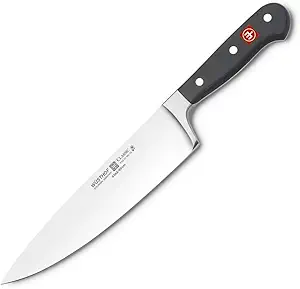When choosing a high-quality kitchen knife, two dominant styles come to mind: Japanese knives and German knives. Both have rich histories and unique traits that suit different cooking styles and user preferences. But which one is better? The answer depends on your specific needs in the kitchen.
Japanese knives are very sharp, light, and great for precise slicing. But, they need more care. German knives are heavy, durable, and versatile. They are great for all kinds of kitchen tasks. If you prioritize sharpness and fine cuts, go Japanese. For durability and ease of use, German knives are better. Which suits your style?
This guide compares Japanese and German knives. It examines their design, functionality, and durability. It also considers which cooking styles they fit best.
Japanese vs German Kitchen Knives

Overview of Japanese Knives

Japanese knives have evolved from centuries of samurai sword-making techniques. Made from high-carbon steel, they have razor-sharp edges. Their lightweight design allows for precise cutting.
Key Features:
- Thin, Hard Blades. These are often made from high-carbon steel (Rockwell Hardness 60-65). This gives them a sharper edge, but it also makes them more brittle.
- Single Bevel & Precision Cutting. Many Japanese knives are single-beveled. This design boosts precision but needs more skill.
- Japanese knives are designed for specific tasks. They excel at sushi slicing, vegetable chopping, and making delicate cuts.
- Lightweight and Easy to Handle. These knives have a partial tang design, making them feel agile and simple to manoeuvre.
Popular Japanese Knife Brands
- Shun
- Global
- Miyabi
- Yoshihiro
- Masamoto
Pros & Cons of Japanese Knives
Pros:
- Exceptionally sharp, ideal for precision cuts.
- Lightweight, reducing hand fatigue.
- Holds an edge longer due to high Rockwell hardness.
- Elegant craftsmanship & traditional artistry.
Cons:
- More fragile and prone to chipping if used incorrectly.
- Requires delicate care and frequent honing with whetstones.
- Generally more expensive than German knives..
Overview of German Knives

German knives originate from Solingen, often called the “City of Blades.” These knives prioritize durability, robustness, and versatility.
Key Features:
- Thicker, Softer Blades. German knives are made from stainless steel (Rockwell Hardness 55-58). This makes them durable, but they are less sharp than Japanese knives.
- Double-Beveled & Versatile. German knives have a curved edge. This design allows for a rocking motion, making them great for everyday kitchen tasks.
- Full Tang Construction. Extends through the handle for added durability and balance.
- Bolster for Safety & Comfort. Many German knives feature a bolster. This helps with grip and protects your fingers.
Popular German Knife Brands
- Wüsthof
- Zwilling J.A. Henckels
- Messermeister
- Victorinox
- F. Dick
Pros & Cons of German Knives
Pros:
- More durable and resistant to chipping.
- Easier to sharpen and maintain.
- Versatile, good for all-purpose cutting.
- Comfortable grip, suitable for rock-chop techniques.
Cons:
- Heavier, can cause hand fatigue over prolonged use.
- Requires more frequent sharpening due to softer steel.
- Thicker blades make them less precise than Japanese knives.
Key Differences Between Japanese and German Knives
Japanese and German knives each have a rich history. They also have unique features that set them apart. Below is a side-by-side comparison based on critical factors.
1. Blade Construction & Material
- Japanese Knives: Japanese knives are usually made from high-carbon steel. This makes them very hard and able to keep a razor-sharp edge. But, this also makes them more brittle and prone to chipping if misused.
- German Knives: German knives use softer stainless steel, often containing chromium. This makes them durable and helps prevent corrosion. This softer steel makes them easier to sharpen but requires more frequent sharpening.
Verdict: If you want a long-lasting sharp edge, go for Japanese knives. If you want knives that last and resist damage, choose German knives.
2. Handle Design & Comfort
- Japanese Knives: They usually have octagonal or D-shaped wooden handles. This design gives a lightweight feel, which helps improve control for delicate cuts.
- German knives: Have ergonomic, full-tang handles. They provide a sturdy grip and balanced weight. This makes them great for long cooking sessions.
Verdict: For comfort and balance, German knives win. For precision and lighter handling, Japanese knives are superior.
3. Blade Profile & Cutting Style
- Japanese knives: Have a straight edge. This makes them great for push-cutting techniques. They are often used for slicing vegetables and fish precisely.
- German knives: Have a curved blade. This design is perfect for the rock-chopping technique. So, they are great for cutting meats and mincing.
Verdict: If you frequently chop vegetables or do intricate slicing, choose Japanese knives. For a more versatile cutting technique, go with German knives.
4. Sharpness & Edge Retention
- Japanese Knives: They have a higher Rockwell hardness of 60-65 HRC. This means they stay sharp longer, but they need proper care.
- German Knives: They have a Rockwell hardness of 55-58 HRC. They don’t hold an edge as long, but they are more resistant to chipping.
Verdict: Japanese knives are sharper and keep their edge longer. But German knives need less maintenance.
5. Blade Finish & Weight
- Japanese Knives: Are lighter and thinner. This lets chefs make precise and delicate cuts. They are perfect for professional chefs.
- German Knives: They are heavier and thicker. These knives are great for home cooks who want durability and easy handling.
Verdict: If you prefer a lightweight, precision-focused knife, go for Japanese knives. If you want something sturdy and versatile, choose German knives.
6. Price & Value Comparison
- Japanese Knives: Generally more expensive, with high-end models costing several hundred dollars.
- German Knives: More affordable and budget-friendly, often priced between $80 – $200.
Verdict: If budget is a concern, German knives offer better value.
7. Maintenance & Durability
- Japanese Knives: Require more care as they are prone to chipping and should not be used on bones.
- German Knives: Low-maintenance and can handle more rugged tasks, making them ideal for busy kitchens.
Verdict: If you want low-maintenance knives, German knives are the better option.
Chicago Cutlery Knives vs Henckels Review
Which Kitchen Knife Is Best for You?
Choose Japanese Knives If…
- You prioritize precision cutting and razor-sharp edges.
- You mainly prepare fish, vegetables, or sushi.
- You don’t mind extra maintenance and careful handling.
- You prefer a lightweight, aesthetically refined knife.
Choose German Knives If…
- You want a versatile, all-purpose knife.
- You frequently rock-chop, cut meat, or work with bones.
- You prefer a heavier knife with a comfortable grip.
- You want a knife that is durable and easy to maintain.
Final Thoughts
So, which knife is better? There’s no universal answer—it depends on your cooking style and preferences.
- Japanese knives excel in precision, sharpness, and fine slicing, but must have careful maintenance.
- German knives are more versatile, durable, and easier to maintain, making them perfect for general kitchen tasks.
If the budget allows, having both in your kitchen arsenal ensures you have the right tool for every job. Invest wisely and let your knife complement your cooking style!
FAQs
Which is better for professional chefs?
Japanese knives are preferred by professionals for their superior sharpness and precision. But, they must more maintenance and care.
Can I use Japanese knives for cutting meat and bones?
No. Japanese knives are designed for precision slicing, not for cutting bones. For meat-heavy tasks, go with German knives.
Are German knives dishwasher safe?
Yes, but it’s recommended to hand wash all high-quality knives to maintain their longevity.
Do Japanese knives require special sharpening techniques?
Yes. They should be sharpened with a whetstone rather than a honing rod.


